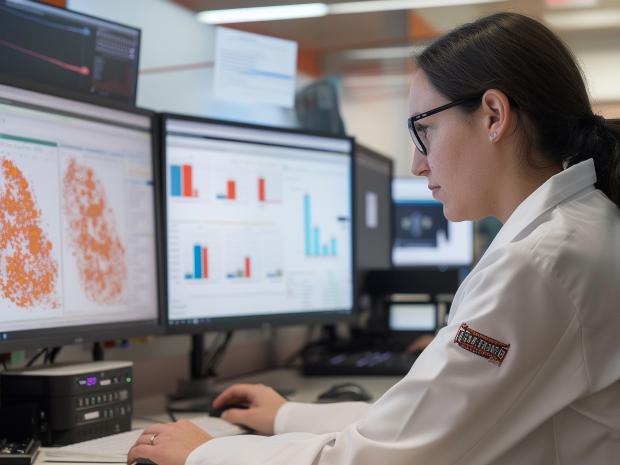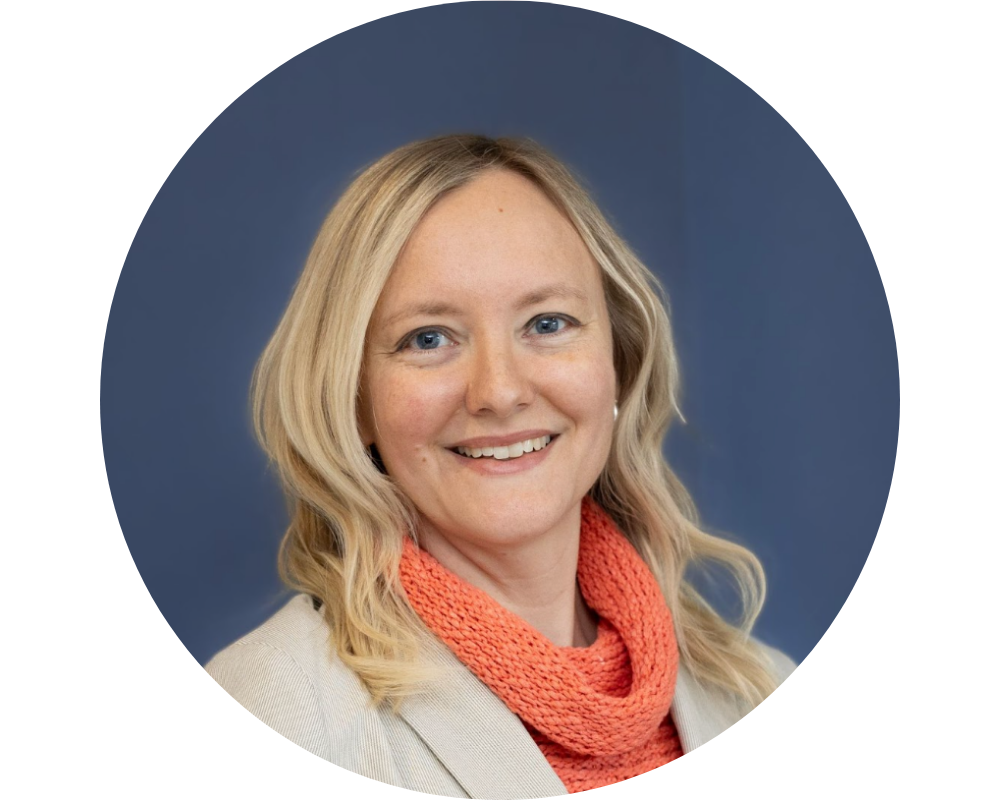Student Projects
View a showcase of Bioinformatics Master's Degree student projects from program related courses.

Occasionally check this page to learn more about our new student projects.
Revolutionizing Protein Analysis with Innovative 2D Imaging Technique
Micheleen Harris, Bioinformatics, MS Student
 Forget complex 3D models! Micheleen Harris, a talented MS student in our online Bioinformatics program, is changing the way we visualize and understand proteins. Her research project transforms intricate protein structures into accessible 2D images called "proteograms." These images are packed with information, revealing not only the protein's shape but also key properties like hydrophobicity and charge distribution. Think of it as a detailed blueprint that unlocks the secrets of these vital molecules.
Forget complex 3D models! Micheleen Harris, a talented MS student in our online Bioinformatics program, is changing the way we visualize and understand proteins. Her research project transforms intricate protein structures into accessible 2D images called "proteograms." These images are packed with information, revealing not only the protein's shape but also key properties like hydrophobicity and charge distribution. Think of it as a detailed blueprint that unlocks the secrets of these vital molecules.


But Micheleen doesn't stop at visualization. Using powerful deep learning algorithms, she compares these proteograms to a vast library of known proteins. This allows her to identify similarities and predict the function of previously uncharacterized proteins, opening exciting new possibilities in fields like drug discovery and personalized medicine.
This groundbreaking approach highlights the exceptional research conducted by students in our program. By fostering intellectual curiosity and providing access to cutting-edge tools, we empower students to push the boundaries of scientific knowledge and contribute to impactful advancements. Micheleen's project is a testament to the innovative spirit and dedication of our students, and it exemplifies the transformative potential of their research.
Using AI to Decode the Secrets of Cancer Treatment
Jeffrey Lipton, Bioinformatics, MS Student
 Jeffrey F. Lipton, M. D., a passionate student in our online Bioinformatics MS program, is a pathologist on a mission to revolutionize cancer treatment using the power of artificial intelligence. He's working with the Thomas Kirchhoff Lab at the NYU School of Medicine to analyze how people with melanoma respond differently to immunotherapy. This type of treatment helps the body's own immune system fight cancer, but it doesn't work the same way for everyone.
Jeffrey F. Lipton, M. D., a passionate student in our online Bioinformatics MS program, is a pathologist on a mission to revolutionize cancer treatment using the power of artificial intelligence. He's working with the Thomas Kirchhoff Lab at the NYU School of Medicine to analyze how people with melanoma respond differently to immunotherapy. This type of treatment helps the body's own immune system fight cancer, but it doesn't work the same way for everyone.
Jeffrey is using cutting-edge AI models, similar to those that power ChatGPT, to analyze huge datasets of genetic information. These models can identify patterns and predict how patients might react to immunotherapy. His goal is to develop tools that help doctors personalize cancer treatment, leading to better outcomes and fewer side effects. This research has the potential to transform how we approach cancer therapy and improve the lives of countless patients.
Uncovering Secrets of Heat-Loving Proteins
Chantal Kloth, Bioinformatics, MS Student
 Chantal Kloth, a dedicated MS student in our online Bioinformatics program, is diving deep into the world of extremophiles—organisms that thrive in scorching hot environments. Her research focuses on ferredoxins, tiny proteins that act like powerhouses, enabling these organisms to survive in extreme conditions. By studying these proteins, Chantal aims to unlock the secrets of their heat-resistant superpowers.
Chantal Kloth, a dedicated MS student in our online Bioinformatics program, is diving deep into the world of extremophiles—organisms that thrive in scorching hot environments. Her research focuses on ferredoxins, tiny proteins that act like powerhouses, enabling these organisms to survive in extreme conditions. By studying these proteins, Chantal aims to unlock the secrets of their heat-resistant superpowers.
Working remotely from San Francisco, Chantal collaborates with a lab at the University of Queensland in Australia. She's using cutting-edge tools like Hidden Markov Models and AlphaFold to analyze the structure of these proteins, creating a roadmap to understand how they function in extreme temperatures. Her work also involves developing an automated system to sift through massive amounts of data, identifying and characterizing these remarkable proteins. This research could pave the way for exciting new discoveries in biotechnology and help us understand how life adapts to even the harshest environments.

